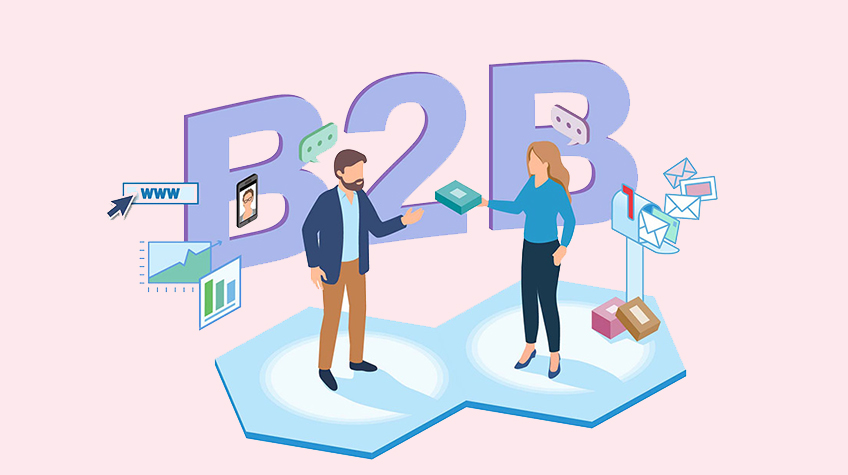
In contrast to B2C (Business to Consumer) marketing, B2B (Business to Business) marketing involves marketing your products or services to businesses. Selling to businesses (B2B) and selling to consumers (B2C) are very different processes. In this post, we shall discuss everything about B2B Marketing and B2B Marketing Strategy.
Let’s get started…
Table of Contents
- What is B2B marketing?
- Why B2B Marketing?
- Different Types of B2B Marketing
- Why is implementing B2B strategy essential?
What is B2B marketing?
B2B refers to business-to-business (B2B) relationships between one or more companies, whether they are selling goods or services. B2B marketing is aimed at businesses and independent individuals rather than end-users (B2C). As a result, the abbreviation stands for “Business to Business.”
The B2B marketing strategies are tailored to the clients’ specific needs and take into account the unique characteristics that businesses must deal with.
Summing up, B2B marketing is a process of one company marketing its products or services to another company. Business-to-business marketing is required when one company’s yield/output is needed in another company to maintain or enhance its operations.
Here are some examples of B2B marketing:
- A manufacturer of car tires is attempting to market and sell its products to automobile manufacturers.
- Similarly, batteries, electronics, hoses, and door locks companies are attempting to market their products to automobile manufacturers.
- A construction company is attempting to market and sell industrial equipment to a heavy equipment dealership.
- Service providers also conduct B2B transactions. For example, a B2B exhibition company selling space to their respective clients.
Another most obvious question that comes to mind is what the need for B2B marketing is. If you’re wondering the same, then scroll down to read more.
Here we go…
Why B2B Marketing?
The days of businesses directly targeting customers are long gone. Businesses today work with other businesses to sell their goods or services. As a result, business-to-business marketing has become essential. The majority of businesses today rely on the products or services of other businesses to operate. A smartphone phone manufacturer, for example, relies on a third-party vendor to supply their finished goods.
There are few companies that handle their entire production and distribution process in-house. The most common example is businesses hiring third-party digital marketing firms to strategically market their products.
The clothing industry is another excellent example to which you can easily relate. The majority of clothing companies rely on other companies for raw materials, such as fabric. Similarly, each company in the ecosystem is dependent on the others to function properly.
Different Types of B2B Marketing
There are primarily three types of B2B marketing, namely
1. Traditional B2B Marketing
2. Personal B2B Selling
3. Digital B2B Marketing
1. Traditional B2B Marketing
Traditional B2B marketing strategies typically employ traditional methods of advertising your products and services. Print, radio, and television are among the most common of these methods. Traditional marketing strategy for b2b business are thought to be the most expensive.
Companies use radio, print, or television advertisements to entice customers/clients to buy their products in this type of marketing.
2. Personal B2B Marketing
It is one of the most long-established and efficient ways of B2B marketing. Relationships and face-to-face networking or interactions are the only things that personal B2B marketing relies on. This method, without a doubt, has the highest conversion rate; however, it cannot be scaled after a certain point.
3. Digital B2B Marketing
Finally, while not the most recent method of B2B marketing, it is undeniably the most popular, having grown enormously in popularity over the last few decades. It is a low-cost method of selling your products or services to a specific audience. You can use digital marketing in a variety of ways, such as running a digital marketing campaign to reach the right people.
More than 80% of people look for products online, making digital B2B marketing a critical component for all businesses. That is why most businesses hire digital marketing firms to ensure that their web pages rank well.
Unlike business-to-consumer marketing, B2B marketing offers products or services that can be complex and require explanation. However, because these products are tailored to the needs of the customer, they are worthwhile.
Successful B2B marketing strategies are based on an excellent website that integrates all b2b communication strategy channels, as well as the use of social media and email marketing. Content marketing, which encompasses everything from blogs to videos, is also gaining traction.
Why is implementing B2B strategy essential?
B2B marketing is the process of conducting business with another company. Companies specializing in B2B are already more informed than individuals, so they conduct extensive research with experts to analyze their needs and find appropriate solutions. Implementing a B2B marketing strategy that provides more specific and specialized product information is critical to the company’s success.
Key Features of B2B Marketing
Higher margins. One of the distinguishing features of the B2B market is that it deals with far lesser but much larger buyers compared to the B2C market. Even a small number of B2B buyers typically
account for the majority of purchases, resulting in higher margins. Simply put, B2C buyers buy small quantities, while B2B consumers place bulk orders. They do, however, spend a lot more money.
Customer acquisition. Customer acquisition through lead generation has grown exponentially in B2B marketing with a B2B growth strategy in recent years. As a result, marketing is increasingly taking on sales-related responsibilities because marketing looks after potential customers until they are truly ready for the business.
Inelastic demand. Another distinct feature of B2B marketing is more inelastic demand. This implies that short-term price changes have little or no effect on B2B product demand.
Wondering why?
Here is why…
Companies that rely on the output of other companies, of course, have their demands determined by consumer demand. As an example, suppose a clothing company sells 100 pieces per month and requires 1000 yards of raw material to do so. It would not buy less raw material simply because prices had risen. It is due to the fact that it must deal with the same number of customers.
The Bottom Line
So far, we’ve covered B2B Marketing Strategy. Hopefully, you found this article to be helpful. Implementing a B2B marketing strategy is critical to your company’s success and achievement of your goals.






